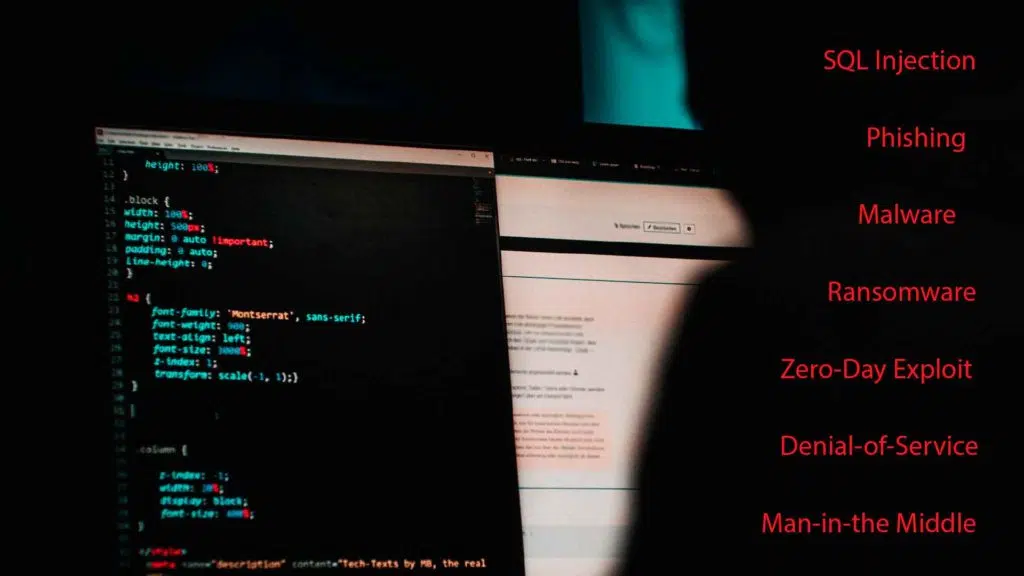What is Cybersecurity?
Briefly, cybersecurity is about prevention and defense. In particular, it’s about protecting your digital data and confidential information. It’s also a process. Ideally, you review your organization’s computer network, and data security needs, to then create cybersecurity policies protecting those assets. While some policies are comprehensive and complex, you can apply basic principles to get started today.

Cyber Security Breaches
What if you have a small company, do you need a cybersecurity policy? Absolutely. No matter the size of your business, if you are using the internet and computers, you are at risk. In fact, cyber thieves often target small businesses assuming they’ve invested fewer resources in security measures.
You’d be further mistaken to think a thief wouldn’t want your digital data. Thieves often look for personal information to use in credit card fraud or identity theft. This means they are looking for yours, your employees, and or your clients’ details. In addition to identity theft, we’ve seen cases where a competitor tricked our client into installing malware that gave the competitor access to their trade secrets.
Price & Cost Guide: TSCM Counter Surveillance Bug Sweep Services
We offer flat fee pricing for our TSCM services, including bug sweeps and electronic analysis of your phones and more for hacking, spyware, malware, and more.
Common examples of a cybersecurity breach, include:
- Phishing attempts, to steal your personal information or trick you into installing malware by clicking a link in an email.
- Malware types are varied and include computer viruses, worms, trojan horses, or spyware.
- Man-in-the-middle attacks involve the interception of communications between two parties to eavesdrop or modify communications between the two.
- Denial-of-service attacks try to overwhelm your website with traffic to disrupt normal operations.
- SQL injection malicious technique to exploit vulnerabilities in a website’s SQL-based application.
- Ransomware malicious software designed to block access to a computer system until a ransom is paid.
- Zero-day exploit cyber attack that occurs on the same day a weakness is discovered in software.
Cyber Security Tips You Can Apply Today
The good news is, there are some simple basics to get you started.
Use a Firewall
A firewall monitors network traffic to prevent viruses and hackers from breaking into your network. Ideally, you’ll have both a software and hardware firewall.
Train Your Staff
At a minimum, employees should understand your cybersecurity policies, learn to recognize phishing attempts, and understand how to use strong passwords. However, training should be routine, not just upon initial hiring. Annual updates go a long ways to prevent your staff from falling for phishing scams.
Update, Update, Update
Ensure you keep your machines and programs running clean. Direct your staff to install updates as soon as manufacturers release them, and then run antivirus software after each update.
We’ve worked with large and small businesses to develop cybersecurity policies. You can read other cybersecurity tips for small businesses from the Federal Communications Commission.
What is Cyber Forensics?
So, what if even after all reasonable measures, someone still makes it past your firewall and steals client data, or staff details? Your response in this situation is cyber forensics. Cyber forensics is the application of digital forensic tools to respond to the security breach. First, detect and identify the breach, then collect and preserve evidence.
Simply put, cyber forensics is your response to a security breach. Typically, it involves detecting the breach, followed by collecting and preserving evidence. We’ve worked with large and small organizations in developing cybersecurity policies as well as responding to breaches.
How Cyber Forensics Helps
If you suspect a breach, you want to act quickly. Not only to limit the damage but also to preserve evidence and your reputation. Most clients understand that breaches happen. In fact, they are in the news regularly. However, your response can set you apart from the competition, and keep your client’s trust. In addition to preserving evidence, our cyber forensics can address the following questions:
- Did you suffer a breach?
- How big was the breach and is it still ongoing?
- How did it happen?
- What should you do to prevent another similar one?
If you suspect a breach, let us help you identify it, gather evidence, and recommend security measures to prevent another one. Call us today at (800) 348-4698.
